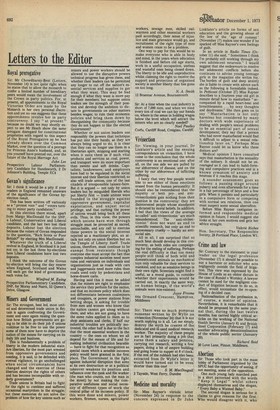Vivisection
Sir: Viewing, in your journal, Dr Linklater's article and the ensuing correspondence on vivisection, I have come to the conclusion that the whole controversy is an emotional one: after all, on the one side we are pulled by our abhorrence of disease, and on the other by our abhorrence of inflicting suffering. I fancy that very few people would like to see either of these emotions erased from the human personality. It should also be remembered that the majonty or both proand antivivisectionists gain nothing from their position in the controversy: they are disinterested people whose standpoint is dictated by moral beliefs. In addition, I feel that the views of the average so-called ' anti-vivisectionist' are much misunderstood. The 'anti-vivisectionist ' does not want an end to scientific research, but only an end to unnecessary cruelty — hardly an antisocial aim.
All in all, I am surprised that so much heat should develop in this controversy, as both sides are compaigning for the ending of suffering. Perhaps the real difficulty is that too many people still think of both wild and domesticated animals as mechanical toys only valuable for their services to mankind, and not as sensitive beings in their own right. Scientists might find it useful, as a moral guide, to consider whether their experiments would be carried out, in exactly the same way, on human beings, if the world's animals were non-existent.
Joyce Froome 44a Ormand Crescent, Hampton, Middlesex










































 Previous page
Previous page